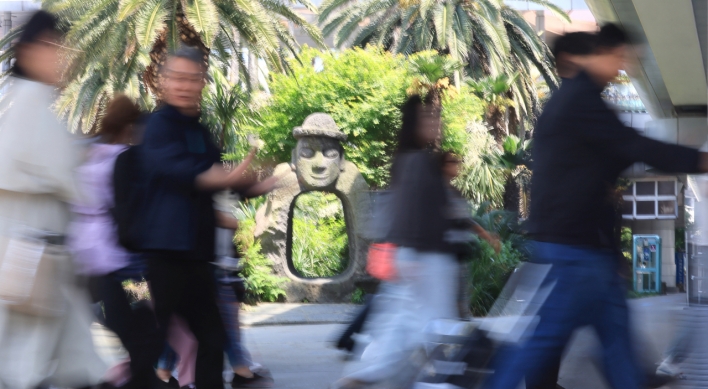North Korea is stepping up its peace offensive following its leader’s New Year speech that called for an end to confrontational relations with Seoul.
The communist country’s official media have churned out reports and editorials in the past week stressing the goal of national reunification and calling for inter-Korean reconciliation.
The overture appears to target an expansion in industrial cooperation and resumption of food handouts and economic assistance from Seoul that are essential to prop up its struggling economy.
The media blitz is also seen as designed to cement legitimacy for Kim at home following a successful launch of its long-range rocket on Dec. 12.
The communist country’s official media have churned out reports and editorials in the past week stressing the goal of national reunification and calling for inter-Korean reconciliation.
The overture appears to target an expansion in industrial cooperation and resumption of food handouts and economic assistance from Seoul that are essential to prop up its struggling economy.
The media blitz is also seen as designed to cement legitimacy for Kim at home following a successful launch of its long-range rocket on Dec. 12.

In the speech, young leader Kim Jong-un expressed his willingness for economic revitalization and engagement with the South’s president-in-waiting Park Geun-hye.
Cross-border ties have plummeted over the last five years due to Pyongyang’s nuclear buildup and Seoul’s reciprocal, condition-laden stance.
Park, who takes office on Feb. 25, has pledged to engage the North and showed her willingness to meet with Kim.
“Perhaps driven by a desire not to waste another five years, Kim Jong-un used the speech to signal Park that he may be receptive to her stated intention to reach out to the North,” wrote Evans Revere, a nonresident senior fellow at Brookings Institution in Washington.
“Reengagement with the South would help bolster the North’s economy, which has gone without significant economic, agricultural, and food aid from (the South) for most of the past five years.”
The Rodong Sinmun, the ruling Workers’ Party’s mouthpiece, on Saturday again urged efforts toward reunification with the South, calling it a “lifelong wish and precept” of Kim Il-sung and Kim Jong-il. The two late autocrats are the current ruler’s late grandfather and father, respectively.
“The North, South and all people around the world must revere the noble aspiration of the great leaders and accomplish the great feat of unification, the greatest, long-cherished wish of our people,” it said.
The paper on Friday also highlighted reunion as a “vital task to reconnect the severed bloodline of our people and end their pain and misery as soon as possible.”
Radio Pyongyang on Thursday called for “venerating Kim Jong-un’s idea for unification unveiled in his New Year address, and opening a new aspect of unification this year.”
The North’s sole, state-run radio station reiterated the need to relinquish the confrontation policy, meet past commitments made by the two Koreas, and reject “foreign influence” in favor of an independent approach to unification.
The dispatches are along the lines of Kim’s address, in which he said unification was the “most urgent assignment that can no longer be delayed.” Action was urged to resolve the North-South standoff and deliver on bilateral joint statements on denuclearization and economic cooperation, including the ones sealed on June 15, 2000 and Oct. 4, 2007.
“This year’s New Year speech embraced more than ever before the resolve and expectations for the unification issue,” said Kim Byung-ro, a professor at Seoul National University’s Institute for Peace and Unification Studies.
“It refrained from hostile expressions toward the South that have hold out over the past few years, but displayed high expectations for a new turn in inter-Korean ties.”
Unification has also become a fresh, rare theme of the Moranbong Troupe’s New Year shows, titled “Till the End with the Party.”
The Rodong Sinmun said Friday that at least three unification-themed songs were featured during the performances.
Among the songs is “Our wish is unification,” which is commonly sung here and became a symbol of reconciliation after being played at various inter-Korean events during the Kim Dae-jung and Roh Moo-hyun governments.
The band’s Jan. 1 show, also attended by Kim Jong-un and his wife, Li Sol-ju, even presented scenes of landmark summits between Kim Jong-il and the two former South Korean presidents in 2000 and 2007, respectively.
Following Pyongyang’s appeasing gesture, Seoul officials expressed optimism but remained cautious.
Foreign Minister Kim Sung-hwan said reiterated late Friday that Seoul should “focus its diplomatic capabilities through coordination with neighboring countries to patch up the cross-border relationship so that the North can make wise and right choices.“
Defense Minister Kim Kwan-jin ordered vigilance Tuesday, saying the North will likely continue provocations in its normally deceptive way this year.
The latest satellite images indicated that the regime has restored its Punggye nuclear test site from flood damage and may conduct another detonation in weeks.
Seoul and Washington are pushing for new sanctions over Pyongyang’s rocket launch, which violates U.N. Security Council resolutions banning its missile and atomic activity.
The North’s state media bombarded President Lee Myung-bak and his aides for their warning against the regime’s possible provocations last week.
“Those who pursue confrontation between the same people and war will not be able to escape destruction,” the Korea Central News Agency said Friday, citing spokesman of the Committee for the Peaceful Reunification of the Fatherland.
By Shin Hyon-hee (heeshin@heraldcorp.com)








![[Weekender] Korean psyche untangled: Musok](http://res.heraldm.com/phpwas/restmb_idxmake.php?idx=644&simg=/content/image/2024/05/02/20240502050841_0.jpg&u=)








![[Eye Interview] 'If you live to 100, you might as well be happy,' says 88-year-old bestselling essayist](http://res.heraldm.com/phpwas/restmb_idxmake.php?idx=652&simg=/content/image/2024/05/03/20240503050674_0.jpg&u=)
